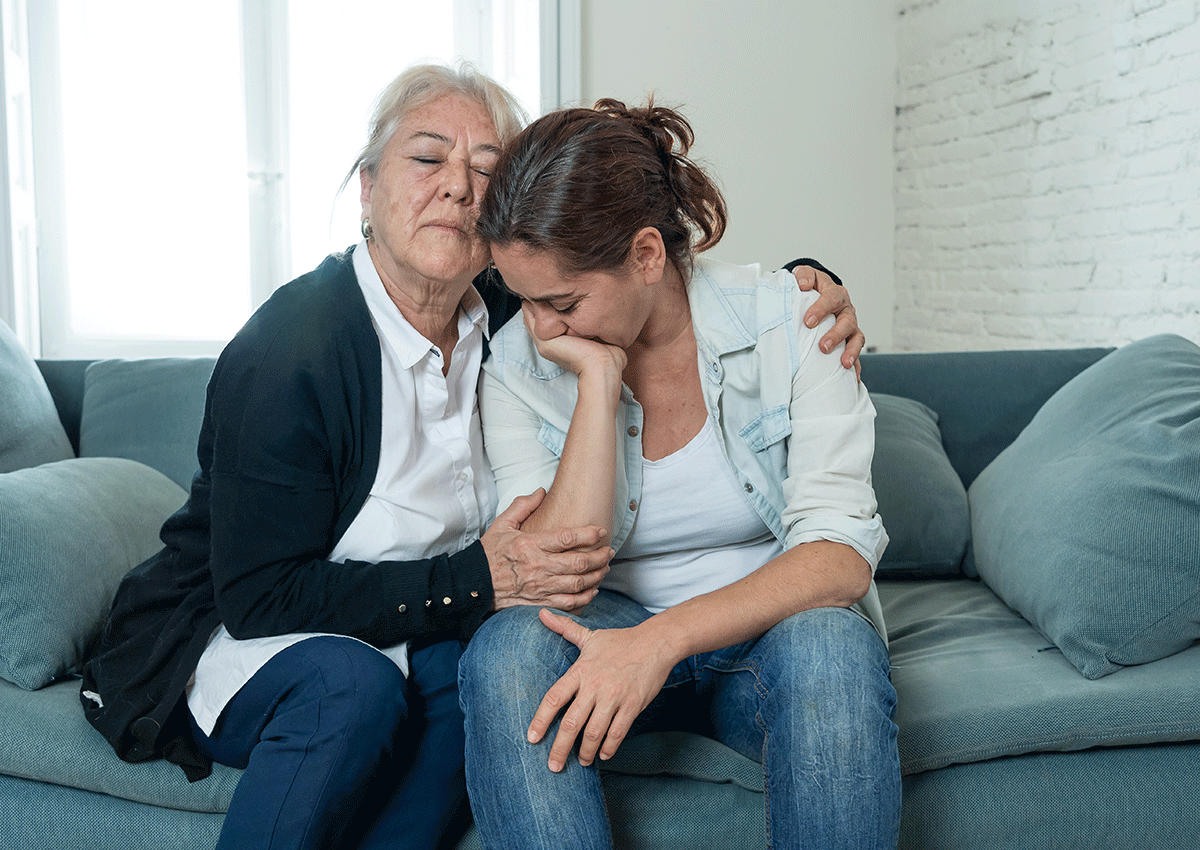When someone you love is caught in the cycle of addiction, it can feel like you’re caught too: watching, worrying, hoping they’ll find their way back. It’s easy to feel overwhelmed or unsure about how much you should step in, what kind of support actually helps, and where to draw the line for your own well-being.
While there’s no perfect guide to navigating this, there are ways to support your loved one with care, protect your own health, and stay grounded through the ups and downs of the process. Here’s what you need to know.
How Addiction Impacts the Whole Family
Addiction doesn’t stay contained to one person. It ripples outward, affecting the emotional health, stability, and connection of everyone around them. Even if no one talks about it openly, the effects show up in everyday life—in trust issues, constant tension, and shifting family roles that often leave people feeling isolated or overwhelmed.
Here are a few ways addiction can impact the whole family:
Emotional Strain
Family members often carry heavy emotional loads—fear, anger, sadness, guilt, and confusion. Over time, that emotional stress can lead to anxiety, depression, resentment, or emotional numbness.
Shifting Family Roles
Addiction can change how family members interact and who takes on certain responsibilities. Some may step into caretaker roles, while others withdraw or act out. These shifts can create unhealthy patterns that are hard to break even after recovery begins.
Broken Trust
When addiction is present, broken promises, secrecy, and lies are common. Trust becomes fragile, and rebuilding it can take a long time—even after the person seeks help.
Constant Chaos or Instability
Addiction often brings unpredictability. Family routines, financial stability, and even safety can be disrupted, creating an environment where anxiety and fear become part of everyday life.
Isolation and Shame
Many families dealing with addiction feel like they have to hide what’s happening. Shame and fear of judgment can keep them from reaching out for support, which only deepens the isolation and pain.
How to Deal with the Impact on Family Dynamics
When addiction disrupts the balance of a family, healing takes more than time—it takes intention. The good news is, with the right support and tools, it’s possible to rebuild trust, strengthen communication, and create a healthier environment for everyone. Here’s how to start.
Acknowledge the Emotional Toll
Addiction doesn’t only affect the person using—it impacts everyone in the household. It’s normal to feel angry, sad, scared, or exhausted. Make space to process those emotions without shame, and remind yourself that your feelings are valid.
How to Do This:
- Journal your feelings to better understand them.
- Talk with a therapist or support group about your experience.
- Allow yourself to grieve what addiction has changed in your family.
- Remind yourself that your emotions are normal and deserve care.
Involve the Whole Family in Healing
Addiction can quietly shift roles, turning siblings into caretakers or partners into rescuers. Family therapy helps everyone speak honestly, work through past pain, and learn new ways of relating. Group support programs like Al-Anon or Nar-Anon also provide connection and perspective from people who understand what you’re going through.
How to Do This:
- Suggest attending family therapy together.
- Find a local Al-Anon or Nar-Anon meeting and invite family members.
- Talk openly about how addiction has changed family roles.
- Encourage each family member to have their own support network.
Strengthen Family Communication
When addiction is in the picture, communication often breaks down. Misunderstandings, secrets, and hurtful outbursts can create distance. Clear, calm, and honest conversations are key. Focus on how you feel and what you need instead of blaming or shaming each other.
How to Do This:
- Use “I” statements when expressing feelings (“I feel hurt when…”).
- Practice active listening without interrupting or defending.
- Schedule regular check-ins as a family to stay connected.
- Stay calm even when conversations are hard.
Rebuild Trust Gradually
Broken trust doesn’t get repaired overnight. If your loved one has hurt you, it’s okay to move slowly. Be honest about what you need to feel safe, and acknowledge the progress they make—even if it’s small. Healing happens in steps, not all at once.
How to Do This:
- Set small, realistic expectations around rebuilding trust.
- Recognize and appreciate honest efforts, even if imperfect.
- Communicate openly when your trust has been hurt.
- Allow trust to rebuild over time rather than rushing it.
Prioritize Self-Care and Boundaries
It’s easy to get so focused on your loved one that you forget to take care of yourself. But your wellbeing matters too. Make time for rest, therapy, and activities that help you feel grounded. Set boundaries that protect your energy so you can show up with compassion, not burnout.
How to Do This:
- Set aside time each week for hobbies or relaxation.
- Attend your own therapy or support group regularly.
- Say no when something feels overwhelming or unsafe.
- Create routines that support your physical and emotional health.
How to Help a Family Member with Addiction
While it’s important to care for yourself and the family as a whole, supporting your loved one through addiction comes with its own challenges. Knowing how to offer help without losing yourself in the process can make all the difference.
1. Educate Yourself About Addiction
Addiction is a chronic brain disease, not a lack of willpower or a moral failure. Learning how it affects a person’s behavior, emotions, and decision-making can help you respond with more compassion and less frustration.
It’s also important to understand the difference between enabling and supporting recovery. When you know what helps versus what harms, you’re better equipped to offer support that truly matters.
How to Do This:
- Read books or articles from reliable addiction recovery sources.
- Attend an Al-Anon or family support group meeting.
- Watch a documentary or expert talk about how addiction affects the brain.
- Talk to a therapist who specializes in family dynamics and addiction.
- Learn how enabling can look like helping—but keeps the cycle going.
2. Encourage Treatment Without Forcing It
You can’t force someone to change, but you can encourage them to take the first step. Use calm, non-blaming language—like “I’ve noticed you’ve been struggling, and I’m really worried about you.” Let them know help is available and that you’ll support them in finding it.
Whether it’s looking into therapy, support groups, or treatment programs, offering to help with the process can reduce overwhelm. Stay patient, but be consistent in reminding them that getting help matters.
How to Do This:
- Say, “You don’t have to go through this alone—I’m here if you want help.”
- Offer to research treatment programs or therapists with them.
- Share a phone number or website for a local support group.
- Keep invitations open even if they say no at first.
- Avoid threatening or pushing when they’re not ready.
3. Set Clear and Healthy Boundaries
Boundaries protect your own well-being and help prevent addiction from taking over every part of your life. Be clear about what behaviors you won’t accept—things like verbal abuse, stolen money, or being lied to.
When boundaries are crossed, follow through on consequences calmly and without guilt. It’s not about punishing your loved one—it’s about creating a safe, respectful environment for both of you.
How to Do This:
- “I won’t give you money, but I can help you find resources.”
- “If you come over under the influence, I’ll ask you to leave.”
- Keep your valuables in a secure place to protect your space.
- Let them know lying will break trust and affect your support.
- Stick to your word, even when it’s emotionally difficult.
4. Avoid Enabling Behavior
It’s natural to want to protect someone you care about. But sometimes, helping too much can keep them stuck. If you’re covering up for them, lying to others on their behalf, or rescuing them from consequences, that’s enabling—not support.
Letting them experience the real effects of their behavior is often what leads to change. It may feel hard in the moment, but it can be a turning point in the long run.
How to Do This:
- Don’t call in sick for them when they’re hungover or using.
- Let them pay their own bills or face financial consequences.
- Avoid covering for them to friends or family.
- Say no when they ask for help that protects the addiction.
- Let them feel the impact of missed commitments.
5. Support, Don’t Control
You can offer love and encouragement, but you can’t do the work for them. Focus on supporting the healthy steps they choose to take. Celebrate their progress without trying to take charge.
Avoid giving ultimatums, delivering lectures, or trying to force change. Recovery is something they have to choose for themselves—but knowing you’re there, steady and supportive, can make all the difference.
How to Do This:
- Say, “I’m proud of you for going to that meeting.”
- Offer to drive them to therapy or group sessions if they ask.
- Be a safe, nonjudgmental space to talk.
- Let them make their own choices about treatment.
- Step back when they need space to figure things out.
What to Do If Your Family Member Refuses Help
It’s heartbreaking to watch someone struggle and say no to the help they need. You might feel powerless, frustrated, or tempted to push harder. But forcing change rarely works—and often drives people further away.
If your loved one refuses help, there are still important steps you can take to protect your peace and keep the door open for future change.
Focus on What You Can Control
You can’t control their choices, but you can control how you respond. Stay grounded in your boundaries and take care of your own emotional health.
How to Do This:
- Continue to set clear, healthy boundaries around behavior you won’t accept.
- Practice self-care and get support for yourself.
- Remind yourself that their refusal is not your failure.
Keep the Lines of Communication Open
Even if they say no today, they might not say no forever. Staying calm, respectful, and available helps them know support is there when they’re ready.
How to Do This:
- Let them know you care and are willing to talk when they are.
- Avoid lectures, pressure, or blame when discussing treatment.
- Be a safe, steady presence instead of adding more conflict.
Resist the Urge to Rescue
Trying to save or fix them often backfires. It can keep them stuck in denial and delay the moment they choose recovery for themselves.
How to Do This:
- Let them face the real consequences of their choices.
- Say no to enabling behaviors, even when it’s uncomfortable.
- Trust that allowing them to struggle may be what leads to change.
Get Support for Yourself
Loving someone through addiction is exhausting. You deserve your own healing and support, no matter what they choose.
How to Do This:
- Join a support group like Al-Anon or Nar-Anon.
- Work with a therapist who understands addiction and family dynamics.
- Connect with others who know what you’re going through.
Find Support for You and Your Family
Helping a loved one through addiction is a heavy burden to carry alone, and you don’t have to. Whether you’re setting new boundaries, working through family dynamics, or figuring out your next step, support is available.
We offer addiction treatment for every step of the recovery journey. Our programs include family therapy to help heal dynamics damaged by addiction. Contact us today to start building the tools, strength, and community you need for the road ahead.


